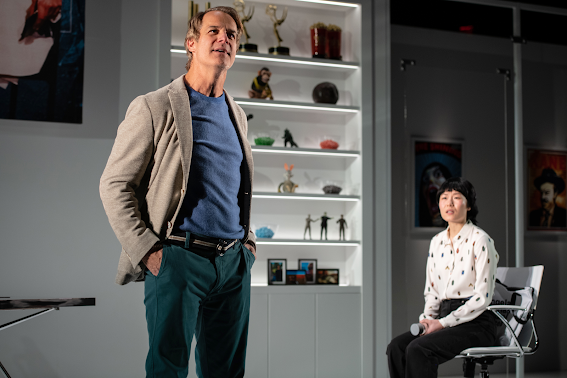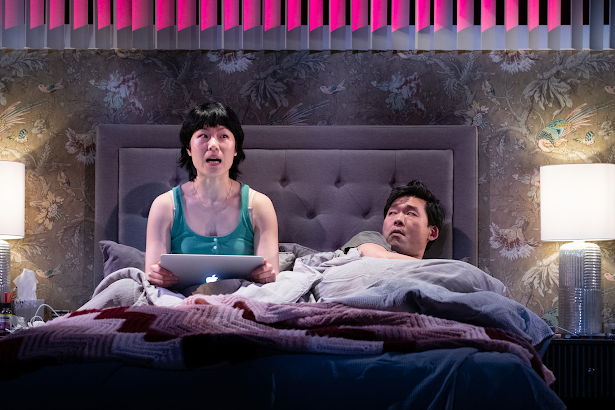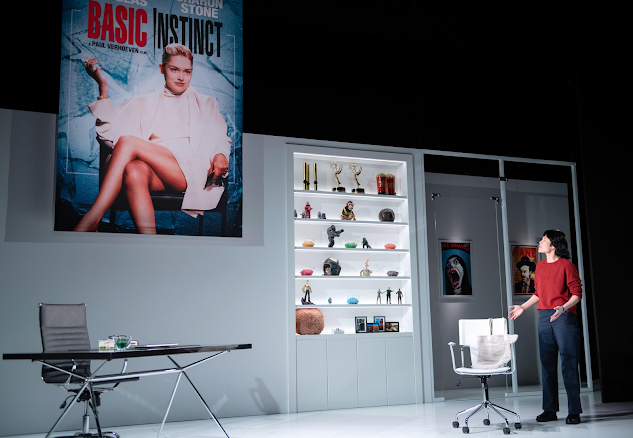Exclusion, Kreeger Theatre, Arena Stage, Washington, DC
Josh Stamberg (Harry) and Karoline (Katie) in the opening scene of Exclusion at Arena Stage at the Mead Center for American Theater, running through June 25. Photo by Margot Schulman.
The current production by Arena Stage’s Kreeger Theatre at the Mead Center for the American Theatre is the tenth in the series of “power plays” they have produced and the last to be produced under artistic director Molly Smith, who is retiring after 25 years with the company. As Smith notes in the program, “The Power Plays cycle is a voice for both of these visions – to raise the voices and stories of unheard Americans from all points in history, and to spur debate as we search for truth and critique power.” Kenneth Lin’s Exclusion is an excellent example, particularly as Asian American Native Hawaiian Pacific Islander month is celebrated, despite the fact that at the same time hate crimes against Asians are on the rise. (Just 14 months ago, six Asian women were murdered during a killing spree in Atlanta.)
As Exclusion begins, Katie sits anxiously in the office of television producer Harry, who has optioned her book about the Chinese Exclusion Act as a television miniseries. For a writer who has spent years researching in order to show the truth of the Act and its effects, including heinous instances of torture and abuse heaped upon Chinese men and women by the White majority, the prospect of making good money is alluring. But.
Harry is a Hollywood blowhard, unctuous and obsequious at the same time. His sleek, beautifully well-appointed office is dominated by a huge poster of the Sharon Stone movie “Basic Instinct,” which Harry pronounces one of the best ever made – and which tells you much of what you need to know about Harry’s tastes and priorities. Harry expresses his fascination with and interest in Katie’s book, but he knows what “they” want, and it isn’t what Katie has written in a draft of the script. “They” want something that fits more closely with “their” vision of the Chinese: a sexualized prostitute as its central character, not a seamstress, because the prostitute would interact with a wide variety of people. Katie protests, but Harry assures her that he will take care of her. He reminds her that it is show business, and he knows what people want and can deliver it.
Katie and her husband, Malcolm, a documentary filmmaker, discuss the dilemma. They left snowy Michigan for sunny California, seeing it as a real land of opportunity. Malcolm asks about the writing staff of the program: are there any other Asians of any type working on the project? What kind of Asian are they? Katie says, “Cauc-Asian.”
Karoline (Katie) and Tony Nam (Malcolm) in Exclusion at Arena Stage at the Mead Center for American Theater, running through June 25. Photo by Margot Schulman.
Since she is the only Asian on the writing staff, and since she sold her material to Harry, there is little she can do besides remove herself from the work, even though it will be associated with her name. Harry and his team turn the project into something unrecognizable: the only concession she has been able to get from Harry is to make the central character a seamstress instead of a prostitute. Katie meets with Australian actress Viola, who has been cast in the leading role. Katie apologizes to Viola because the project bears little resemblance with the book, but Viola isn’t worried much about what she will be playing, just that this will be her big break. At least Katie is successful in persuading Viola that the character will work just as well as a seamstress.
The show becomes a big hit, with a character named “Doctor Fu” and the prerequisite amount of stereotypical kung fu. In an unexpected twist, Katie grudgingly admits that, despite the fact that it retains very little (if any) of her vision, she likes it.
Much to Katie’s surprise, the show is nominated for a prestigious Humanitas Award. (This is slyly ironic, as, per their website, “Humanitas honors and empowers film and television writers whose work explores the human condition in a nuanced, meaningful way.”)
At the awards, Katie and Viola have some true bonding moments, conversing in either Cantonese or Mandarin, a tender display of solidarity. (I understand that an English translation was posted in the theatre lobby, though I missed it.) Even without understanding the words, the interaction conveyed the intended emotional impact.
Michelle Vergara Moore (Viola) and Karoline (Katie) at the Humanitas Awards, in Exclusion at Arena Stage at the Mead Center for American Theater, running through June 25. Photo by Margot Schulman.
Katie meets with Harry at the awards ceremony. Harry expresses an interest in producing a related show. Using her newfound power, Katie agrees, but only if she can have a two million dollar guarantee to produce the show her way: truthfully. The play could have ended there with a sense of revenge and accomplishment, but there is an epilogue of sorts: a brief scene in which we see race-based violence with Chinese men being tortured and murdered by rioters. It is disturbingly realistic, despite the fact that several obvious dummies are taking the place of hanged bodies. Then a director calls “cut,” and we realize we are watching filmmaking. The director is Katie’s husband Malcolm. He struggles with the script as Katie approaches the hanged bodies, lovingly touching each one as the play ends.
Many audience members will not be aware of the history of Chinese immigration, nor the important part Chinese immigrants played in the building of this country. One of the great engineering achievements in American history, the construction of the transcontinental railroad, was completed in 1869, thanks in no small part to the work of thousands of Chinese workers. Many had immigrated to the United States during the California gold rush, but, their work on the railroad completed, public sentiment turned violently against these outsiders. Fearing the “yellow peril,” an imagined horde of Asians overrunning the western U.S., the Page Act of 1875 ended the free-flow of Chinese to the U.S. by barring Chinese women from entering. Three years later, the Chinese Restriction Act, commonly referred to as Chinese Exclusion Act passed Congress and was reluctantly signed by President Chester A. Arthur. The immigration of Chinese laborers was forbidden for 10 years (a compromise: the original act called for a 20-year ban). This was the first (and as yet only) piece of legislation prohibiting the immigration of an entire nationality. The act was extended and extended, only to be superseded in 1943, after the Chinese had joined the U.S. war against the Japanese, when the act was repealed and Chinese immigration was allowed to resume – for 105 people per year. (There were exceptions for students, merchants, and certain professionals.) Parallels to contemporary concerns about immigration are fully in order.
Understanding this tragic background enhances the understanding of the play, and gives the play more “bite.” But without a full understanding of that “exclusion,” one can still see today’s effect of exclusion as Katie (and other Asians) are excluded from telling their stories of what actually transpired. I was reminded of the lyrics of a song from Hamilton, “Who lives, who dies, who tells your story.” The fact is that it does matter who tells the story. The Harrys of this world are incapable of telling the honest stories of marginalized Americans and some of the more unpleasant parts of our history that the Katies can share.
Even without the cultural and historical context, Exclusion is a fast-paced, witty play with characters we can care about (Katie and Malcolm) and one we can actively despise (Harry). Playwright Kenneth Lin has a gift for repartee, though I found Harry’s over-use of a particular curse word somewhat off-putting. While it does help characterize Harry’s casual California character, sometimes less is more. Lin made excellent use of a couple of solo side scenes that helped mask set changes (Viola facetiming her children in one, Malcolm supposedly practicing his Mandarin in another).
The actors are excellent. It took me a bit to warm up to Karoline as Katie, who seemed rather tentative at first, but by the second scene I was fully on board. Josh Stamberg is completely believable as Harry as he demonstrates his true colors, but then finds a moment or two of redemption in the final scenes. Tony Nam is appealing and sympathetic as Katie’s husband Malcolm. Michelle Vergara Moore brings a touch of glamour to the stage as Viola, the actress who plays the leading role in the television production. Director Trip Cullman keeps the action moving crisply.
Scene designer Arnulfo Maldonado creates exquisitely realistic locations. I especially liked Harry’s office, complete with two Emmys and two MTV “golden popcorn” awards. Designer Sarah Cubbage has created costumes that contribute nicely to character, from Harry’s California pastels to exquisite gowns worn by Katie and Viola at the Humanitas awards. Lighting designer Adam Honoré and sound designer Sun Hee Kil also contribute to the play’s success.
Karoline (Katie) in Harry's office, Exclusion at Arena Stage at the Mead Center for American Theater running through June 25. Scene design by Arnulfo Maldonado. Photo by Margot Schulman.
Four of the last five productions I have seen (Angels in America, The Jungle, Here There Are Blueberries, and Exclusion) have dealt with broad subjects of hate and fear, whether about those with a different sexual orientation, refugee status, religion, or nationality, a sad reminder that hate and fear persist. Two of the last six (Pacific Overtures and Exclusion) were told from Asian viewpoints – a relative rarity. The remaining show of the last six, Passing Strange, provided an African American voice. Taken together, they represent the rich diversity of Washington area theatre. All deserve to be seen. Exclusion continues at Arena Stage through June 25.







Comments
Post a Comment